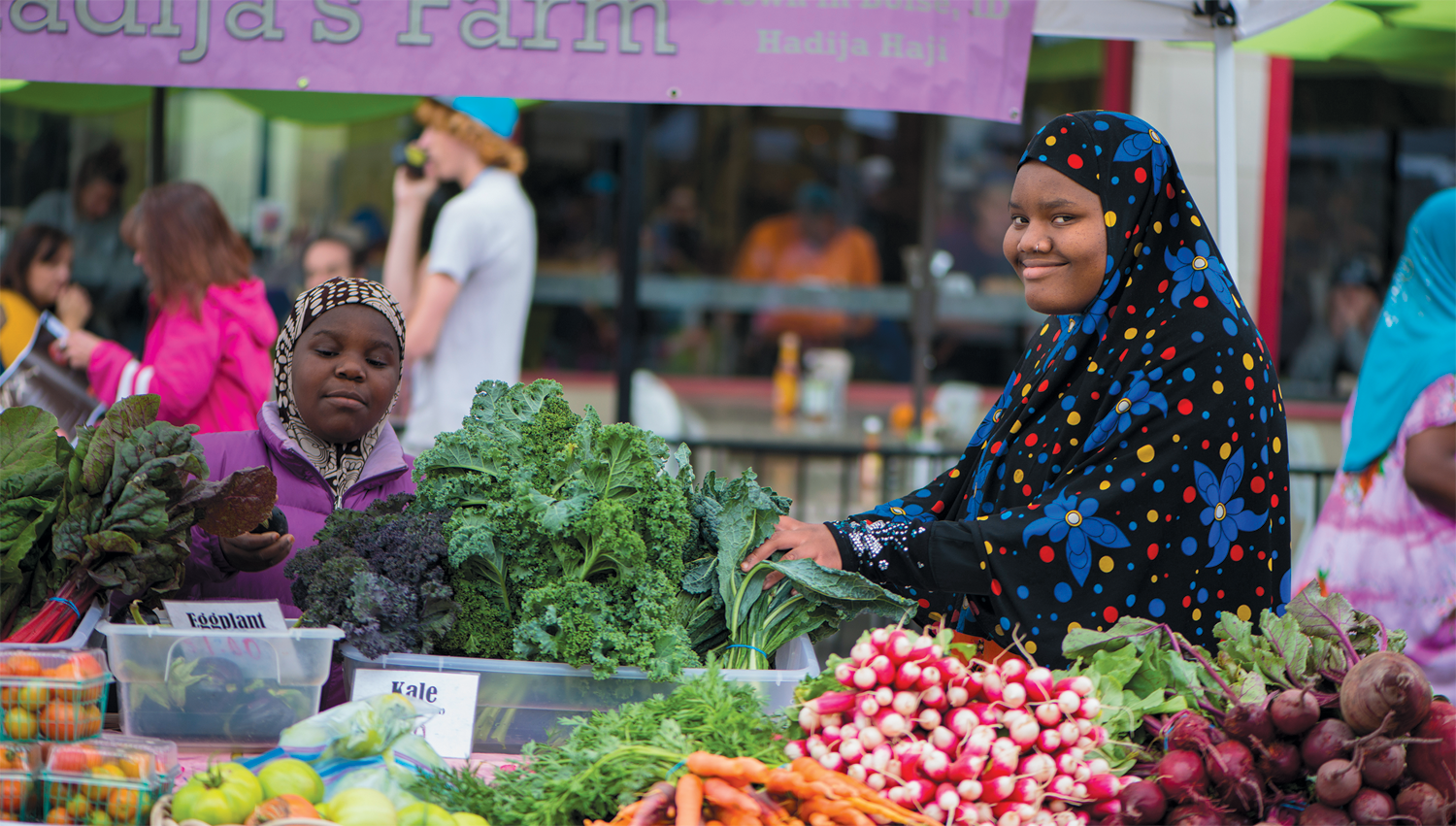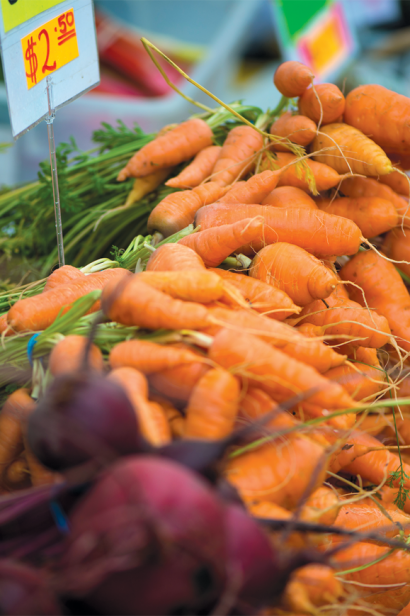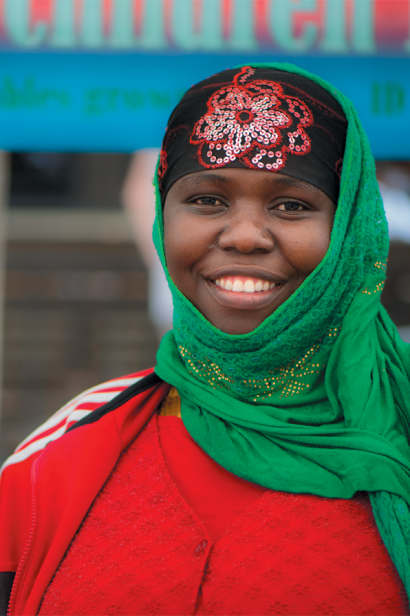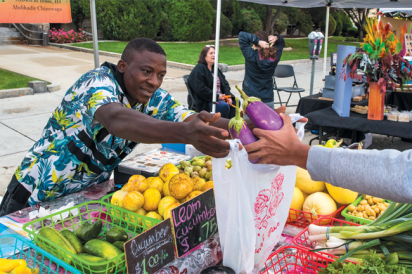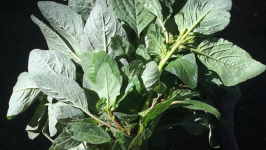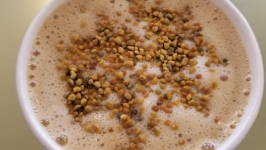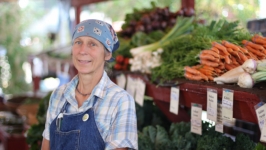Cultivating a New Life
Hidden among tall rows of corn and other crops, Safiya Abdi crouched down as she picked cherry tomatoes for that weekend’s farmers market and her Monday-afternoon CSA. Her hands moved efficiently, plucking the ripest produce as she spoke.
Originally from Somalia, Abdi spent most of her childhood growing up in refugee camps in Kenya. She arrived in Boise in 2005, at the age of 19, having been resettled to Idaho with her family. Five years later, Abdi began growing vegetables on her mother’s Global Gardens plot in Boise and decided to get her own a year after. Now, she manages nearly two acres spread over three different lots and is a leading entrepreneur in the program.
As the name suggests, Global Gardens provides arable land for refugees in the Boise area. Most families in the program cultivate produce for personal consumption. Program coordinator Katie Painter estimated more than 300 refugee families participate in community garden plots spread out over nine active sites. Much of this land is owned by churches and a synagogue; these religious organizations also may provide gardening space to members of their congregations and neighbors.
Also part of the Global Gardens program, nine refugee families are considered entrepreneurs. Most grow produce as part of a community-supported agriculture (CSA) harvest-subscription program or to sell at Boise’s two farmers markets, while two entrepreneurs sell their produce wholesale to local restaurants. All these entrepreneurs farm their land while working full time at other jobs.
Besides growing healthy, local food for their families and their customers, Global Gardens, a part of the Idaho Office for Refugees, also provides refugees the opportunity to work outdoors and spend quality time with their families. While picking tomatoes, Abdi said, “See how beautiful it is here outside. We’re working with plants instead of spending our off day watching TV and being a couch potato. It’s better this way.”
A growing body of scientific research correlates positive mental and physical outcomes with spending time in nature and the outdoors. Recent articles in TIME Magazine and National Geographic discuss these findings from studies conducted as far away as Japan and Sweden, and as close as Utah and Eastern Oregon.
Joining Abdi in harvesting crops from her garden off Liberty Street, were her husband, brother and sister-in-law. She added, “It’s nice to work with my family. I teach my kids how they have to work very hard. They are very happy to do this.”
At another CSA farm, this one on Pond Street, Painter, the program coordinator, led me through sometimes muddy fields, treading carefully not to step on newly planted produce. “Our growers, by and large, really like being down at the farmers markets and interacting with American-born people.” She pointed out that the farmers markets provide a social structure so it’s not awkward for a stranger to come up to them and ask questions.
Ali Mbanda, for instance, also a refugee from Somalia and camps in Kenya, sells onions, beets, peppers and other vegetables from his booth at the Boise Farmers Market. When a regular customer comes by, he likes to slip an extra cucumber or zucchini into that person’s bag. Painter said Global Gardens farmers are proud of the work they do and being at the market is “kind of a prestigious position” for them.
She added, “When they live in refugee camps for so many years, and they’re told what they can do and where they can go and they’re given food rations and told what they can eat . . . they have so few choices.”
She gives these farmers guidance, answers questions and acts as a mentor, but, at the end of the day, they are the business owner in charge of what they want to do and what works for them. “Having them have something that’s very hands-on and theirs—using skills that they enjoy and they get to make the decisions—is the most empowering part for a lot of them.”
As explained on Global Gardens’ website, “Refugees differ from other immigrants in that they did not leave their home country by choice. Rather, they were forced to leave due to political unrest, persecution, or fear of death. Refugee arrivals in Idaho vary greatly in their personal histories. Many spent years in refugee camps without any modern amenities, little access to education, and minimal employment history.” In addition, these new arrivals to Idaho “face numerous cultural, linguistic, and economic barriers while entering the local farm economy as growers or consumers.”
Despite these obstacles, some of these entrepreneurs end up markedly supplementing their income from their jobs elsewhere. Abdi is a prime example: She made enough from the farmers market and her CSA, while also working full-time at a local Fred Meyer, to place a down payment on a home in Boise.
She said, “I don’t know where [my] Somalia is. I would never recommend my family go there, not even my kids. Boise’s my home and I tell my kids ‘Boise’s your home.’ It’s peaceful and nice people . . . I always feel like I’m in my country because of the respect from people in Boise.”


